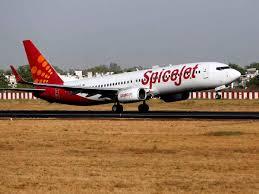After raising Rs 3,000 crore through a qualified institutional placement (QIP), budget airline SpiceJet announced on Monday that it plans to use this capital to accelerate its fleet expansion and overall growth. The airline aims to rebuild its reputation, which has suffered in recent years due to significant financial challenges.
SpiceJet stated that the new funds will be crucial for reactivating its fleet, acquiring new aircraft, investing in technology, and entering new markets. The airline is focused on restoring its image for efficiency and reliability, ultimately enhancing passenger connectivity and travel options.
The QIP, which concluded on September 18, was oversubscribed, reflecting investor confidence in SpiceJet’s growth potential. In addition to the Rs 3,000 crore raised through the QIP, the airline is set to receive an additional Rs 736 crore from a previous funding round. The QIP attracted a diverse group of leading institutional investors and mutual funds, indicating strong market belief in SpiceJet’s ability to navigate challenges and capitalize on the rising demand in the aviation sector.
Notable investors in the SpiceJet QIP include Goldman Sachs (Singapore), Morgan Stanley Asia, BNP Paribas Financial Markets, Nomura Singapore, Tata Mutual Fund, Discovery Global Opportunity Ltd, Societe Generale, Authum Investment, Bandhan Infrastructure Fund, White Oak, Carnelian Bharat Amrikaal Fund, 360 ONE Equal Opportunity Fund, and The Jupiter Global Fund. SpiceJet’s Chairman and Managing Director, Ajay Singh, remarked that the robust response from investors underscores their confidence in the airline’s potential for rapid growth and its ambition to become a major player in India’s expanding aviation market. He described the fundraising as a crucial step for SpiceJet as it aims for new heights in the industry.
While the broader Indian aviation sector has largely recovered from the impacts of the COVID-19 pandemic, SpiceJet has struggled with significant financial distress, which has adversely affected its fleet, network, and market share. The airline's domestic market share dropped to a low of 2.3% in August, down from 5.6% at the start of the year, as many of its aircraft remain grounded due to issues such as disputes with lessors and technical problems.
Currently, SpiceJet operates around 20 aircraft, with nearly twice that number grounded. The financially troubled airline has faced challenges with aircraft lessors and some airports, leading to irregular salary payments for its staff. Due to these difficulties, the Directorate General of Civil Aviation (DGCA) has placed SpiceJet under enhanced surveillance since late August to ensure safe flight operations.











